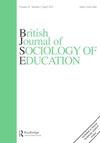快乐、骄傲和羞耻:在教育企业的情感经济中工作
IF 2.1
3区 教育学
Q1 EDUCATION & EDUCATIONAL RESEARCH
引用次数: 0
摘要
摘要本研究的重点是从事教育事业的人想要实现什么。其目的是探索(1)教育商业部门是如何作为工作场所和教育系统的一部分进行话语构建的,以及(2)这种话语是如何在情感经济中组织的——也就是说,情感的评估如何区分被认为是“好”或“坏”的主观、实践和制度。该分析基于对瑞典教育商业部门22名工作人员的采访。研究结果揭示了三种话语:官僚话语、企业家话语和利润话语。与官僚话语相关的情绪是焦虑、内疚和无聊。与创业话语相关的是快乐、创造力和幸福感。羞耻感和自豪感附属于利润论。情感经济将商业部门视为理想,而将公共部门视为相反。研究新自由主义的“光明面”有助于我们理解它的力量。本文章由计算机程序翻译,如有差异,请以英文原文为准。
Joy, pride, and shame: on working in the affective economy of edu-business
Abstract This study focuses on what people working in edu-business want to achieve. The aim is to explore (1) how the edu-business sector is discursively constructed as a work-place and part of the education system, and (2) how this discourse is organized within an affective economy – that is how the valuation of emotions distinguish what are considered as ‘good’ or ‘bad’ subjectivities, practices, and institutions. The analysis draws on interviews with 22 people working in Sweden’s edu-business sector. The results illuminate three discourses: a bureaucratic, an entrepreneurial, and a profit discourse. Emotions attached to the bureaucratic discourse are anxiety, guilt, and boredom. Connected to the entrepreneurial discourse are joy, creativity, and well-being. Shame and pride are attached to the profit discourse. The affective economy constructs the business sector as desirable and the public sector as its opposite. Studying ‘the bright side’ of neoliberalism helps us to understand its power.
求助全文
通过发布文献求助,成功后即可免费获取论文全文。
去求助
来源期刊
CiteScore
3.70
自引率
9.50%
发文量
74
期刊介绍:
British Journal of Sociology of Education is one of the most renowned international scholarly journals in the field. The journal publishes high quality original, theoretically informed analyses of the relationship between education and society, and has an outstanding record of addressing major global debates about the social significance and impact of educational policy, provision, processes and practice in many countries around the world. The journal engages with a diverse range of contemporary and emergent social theories along with a wide range of methodological approaches. Articles investigate the discursive politics of education, social stratification and mobility, the social dimensions of all aspects of pedagogy and the curriculum, and the experiences of all those involved, from the most privileged to the most disadvantaged. The vitality of the journal is sustained by its commitment to offer independent, critical evaluations of the ways in which education interfaces with local, national, regional and global developments, contexts and agendas in all phases of formal and informal education. Contributions are expected to take into account the wide international readership of British Journal of Sociology of Education, and exhibit knowledge of previously published articles in the field. Submissions should be well located within sociological theory, and should not only be rigorous and reflexive methodologically, but also offer original insights to educational problems and or perspectives.

 求助内容:
求助内容: 应助结果提醒方式:
应助结果提醒方式:


